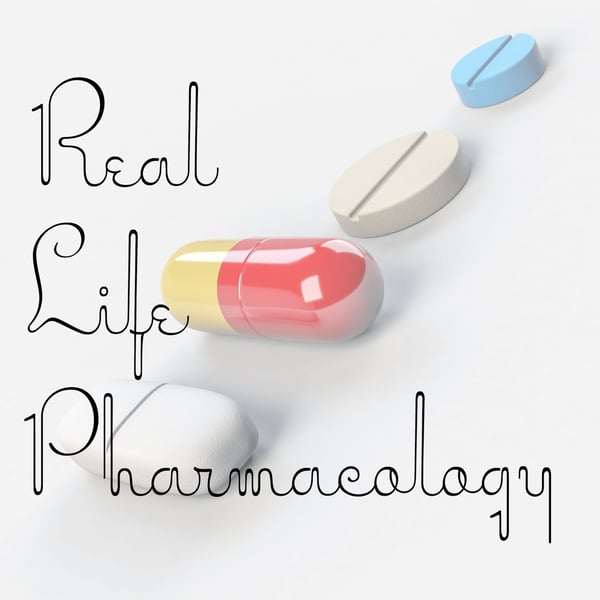Folic Acid Pharmacology
Real Life Pharmacology - Pharmacology Education for Health Care Professionals
Eric Christianson, PharmD; Pharmacology Expert and Clinical Pharmacist
5 • 716 Ratings
🗓️ 10 June 2021
⏱️ 13 minutes
🧾️ Download transcript
Summary
The dosages used most often when supplementing folic acid are in the 1-5 mg range, and most of the time it will be 1 mg. Folic acid has a relatively safe adverse drug reaction profile. Some possible adverse drug reactions are flushing, malaise, erythema, skin rash, and hypersensitivity reactions. Although uncommon, the chance for an adverse drug reaction occurring increases as the dose increases. For monitoring folic acid, the normal levels can vary between 2-20 ng/mL, but they can vary based upon the lab. A type of anemia that can manifest with a folic acid deficiency is megaloblastic anemia. When assessing megaloblastic anemia, vitamin B12 levels should also be assessed.
Folic acid levels can be impacted by phenytoin, methotrexate, trimethoprim and sulfamethoxazole, sulfasalazine, triamterene, and alcohol. When a patient is only taking trimethoprim and sulfamethoxazole for acute treatment of a UTI, folic acid levels aren’t as concerning. Whenever it changes from acute treatment to prophylaxis, folic acid levels should be monitored more closely. Theoretically, folic acid can lower concentrations of phenytoin, and phenobarbital, so closer monitoring may be warranted.
Show notes provided by Chong Yol G Kim, PharmD Student.
Transcript
Click on a timestamp to play from that location
| 0:00.0 | Hey all, welcome back to the Real Life Pharmacology podcast. I'm your host, pharmacist, Derek Christensen. |
| 0:05.7 | Thank you so much for listening today. As always, go check out RealLife Pharmacology.com. |
| 0:12.3 | Grab your free 31-page PDF on the top 200 drugs. Great little study guide, refresher for board exams, |
| 0:19.8 | or if you're just looking to get up to speed with |
| 0:21.6 | practice, or if you're in school, taking pharmacology exams, finals, things like that. Good little |
| 0:28.3 | refresher with lots of real-life pearls and things that matter with each of the top 200 drugs there. |
| 0:35.6 | So again, real-lifepharmacology.com, go snag that free PDF. |
| 0:40.4 | All right, so let's get into the drug today, and it's not really a drug, I guess. It's more of a |
| 0:45.7 | supplement, and that is folic acid. But it definitely plays a role in medication therapy, particularly when we use specific drugs, |
| 0:56.9 | which I'll discuss. It definitely plays a role there for sure. A little bit about folic acid, |
| 1:03.4 | water-soluble vitamin. So typically accumulation isn't a big deal in most situations. |
| 1:12.6 | Compare that to some of the fat soluble vitamins where excessive supplementation |
| 1:17.2 | could potentially lead to more accumulation there. |
| 1:23.5 | Mechanistically, folic acid plays a role in forming co-enzymes and metabolic reactions and processes, |
| 1:33.3 | DNA production, and red blood cell production, which, you know, folic acid, if you're looking at deficiencies in clinical practice, |
| 1:44.7 | one of the most important things that we're going to look out for is potentially anemia. |
| 1:50.4 | And again, that goes back to folic acid being important with red blood cell production. |
| 1:57.5 | Other uses, prevention of neural tube defects in females of childbearing age, |
| 2:04.2 | so that's certainly a use and a reason for supplementation that I've seen actually in clinical practice. |
| 2:12.1 | Certain medications, I'll get into that a little bit, just a couple off the top of my head, |
| 2:17.5 | methotrexate, folic acid supplementation is always recommended with that medication, |
| 2:23.1 | or typically recommended. |
... |
Please login to see the full transcript.
Disclaimer: The podcast and artwork embedded on this page are from Eric Christianson, PharmD; Pharmacology Expert and Clinical Pharmacist, and are the property of its owner and not affiliated with or endorsed by Tapesearch.
Generated transcripts are the property of Eric Christianson, PharmD; Pharmacology Expert and Clinical Pharmacist and are distributed freely under the Fair Use doctrine. Transcripts generated by Tapesearch are not guaranteed to be accurate.
Copyright © Tapesearch 2025.

